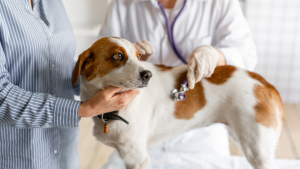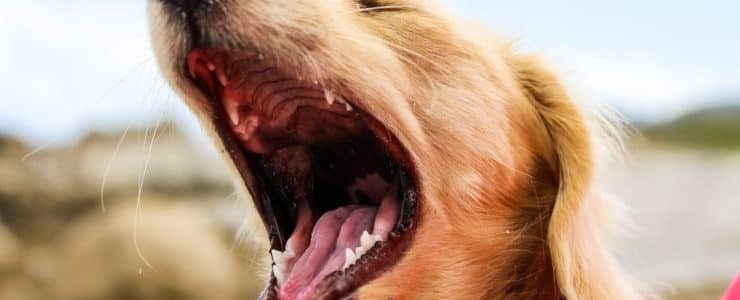
It’s a few days after a fun visit to the dog park and you notice your dog acting differently. Something is wrong. They’ve got a terrible cough. But what does it mean?
All dog owners go through this – their pup contracts kennel cough from being around another dog with the same ailment. Don’t worry, it’s not as scary as it sounds!
Every year, thousands of our furry loved ones get sick with kennel cough (AKA canine tracheobronchitis or bordetellosis), a highly contagious upper respiratory infection that we humans commonly refer to as a cold. But unlike an ordinary human cold, pets cannot self-medicate or drive themselves to the doctor to fill out a prescription. That’s why they have us – their loving owners!
How Does Kennel Cough Spread?
Imagine a sneeze. When a dog goes “achoo!” an immense amount of moisture droplets are released and fly through the air. The same happens with a cough. If a dog is infected with kennel cough, moisture droplets containing the Bordetella bacteria are left behind in the air and on objects such as food bowls, toys, shared beds, collars, leashes, etc…
And as we all know, dogs love to sniff each other! Nose-to-nose contact is hard to avoid. But if your pup comes nose-to-nose with a dog infected with kennel cough, your dog is at risk of the bacteria finding its way into their upper respiratory tract. And if it sticks, then unfortunately, your pup may get sick too.
Where do dogs typically catch kennel cough?

Dogs commonly contract kennel cough at places where large amounts of canines congregate, such as boarding and daycare facilities, shelters, dog parks and training groups. However, it is so contagious, it only takes one interaction with an infected pup for it to spread.
Animal shelters find dealing with kennel cough challenging for precisely this reason. It can be hard to control whether new dogs coming in are sick and shelters operate with minimal space, making quarantining an infected pup doubly tricky.
And having a kennel cough outbreak at a boarding facility or daycare center can be enough to close the affected facility down until it runs it course and they can reopen safely.
Symptoms of Kennel Cough

The most common symptom is a dry, hacking, persistent cough with a distinct honking sound, but some dogs may also experience additional symptoms like:
- Retching
- Sneezing
- Runny nose
- Low Fever
- Lethargy
- Eye discharge
- Loss of appetite
Symptoms usually take two to three days to develop following exposure, but can take u to ten days. If you hear that distinct cough or notice any of these other symptoms, be sure to consult your veterinarian immediately. Kennel cough is easily treated, but its symptoms are similar to those of more severe illnesses like canine distemper or canine flu.
Kennel Cough Treatment
Depending on the severity of the infection, there are a few different ways to help soothe your pup’s throat and help them feel better. Mild cases are best treated with rest and hydration. So give your dog lots of water and try to keep them relaxed. Offering nutritious food and plenty of quiet time to sleep will speed up their recovery. And of course, isolation is key to stop the spread. Recovering dogs should be kept away from other dogs for two weeks after symptoms subside.

Your veterinarian might prescribe a cough suppressant or antibiotic for more serious cases. And on rare occasions, kennel cough could be severe enough to require hospitalization, though this is far more likely for immunocompromised dogs and puppies.
Seeing our dogs feel unwell can be heartbreaking, and limiting their interactions and lessening their activity can be difficult. But remember, kennel cough doesn’t last long – typically only 1-2 weeks. With your love and care, they will be on the mend soon.
Preventing Kennel Cough
There is a vaccine commonly available from your veterinarian for the Bordetella bacterium which is the most common cause of kennel cough. We recommend you get this vaccine if you plan to frequent places with a lot of other dogs present. Most boarding, daycare and training facilities require proof of vaccination. However, kennel cough can be caused by other agents, so the vaccine may not prevent your dog from contracting the disease.
Even though contracting kennel cough is not preferred, it is not a reason to shy away from hanging out with other dogs. Take preventative measures, stay away from dogs with coughs and speak to your vet if you think your dog has been exposed or is presenting symptoms.





Leave a Reply